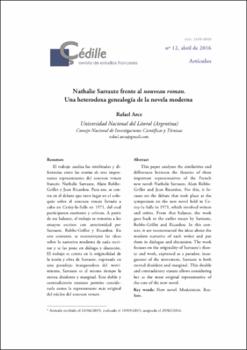Nathalie Sarraute frente al nouveau roman. Una heterodoxa genealogía de la novela moderna
Autor
Arce, RafaelFecha
2016Resumen
El trabajo analiza las similitudes y diferencias entre las teorías de tres importantes representantes del nouveau roman francés: Nathalie Sarraute, Alain Robbe-Grillet y Jean Ricardou. Para eso, se centra en el debate que tuvo lugar en el coloquio sobre el nouveau roman llevado a cabo en Cerisy-la-Salle en 1971, del cual participaron escritores y críticos. A partir de ese balance, el trabajo se remonta a los ensayos escritos con anterioridad por Sarraute, Robbe-Grillet y Ricardou. En este contexto, se reconstruyen las ideas sobre la narrativa moderna de cada escritor y se las pone en diálogo y discusión. El trabajo se centra en la originalidad de la teoría y obra de Sarraute, expresada en una paradoja: inauguradora del movimiento, Sarraute es al mismo tiempo la eterna disidente y marginal. Este doble y contradictorio estatuto permite considerarla como la representante más original del núcleo del nouveau roman. This paper analyzes the similarities and differences between the theories of three important representatives of the French new novel: Nathalie Sarraute, Alain Robbe-Grillet and Jean Ricardou. For this, it focuses on the debate that took place at the symposium on the new novel held in Cerisy-la-Salle in 1971, which involved writers and critics. From that balance, the work goes back to the earlier essays by Sarraute, Robbe-Grillet and Ricardou. In this context, it are reconstructed the ideas about the modern narrative of each writer and put them in dialogue and discussion. The work focuses on the originality of Sarraute’s theory and work, expressed as a paradox: inaugurator of the movement, Sarraute is both eternal dissident and marginal. This double and contradictory statute allows considering her as the most original representative of the core of the new novel.





